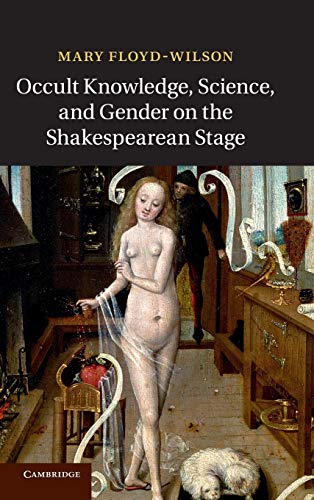Items related to Occult Knowledge, Science, and Gender on the Shakespearean...

Synopsis
In this ground-breaking study, Mary Floyd-Wilson argues that the early modern English believed their affections and behavior were influenced by hidden sympathies and antipathies that coursed through the natural world. These forces not only produced emotional relationships but they were also levers by which ordinary people supposed they could manipulate nature and produce new knowledge. Indeed, it was the invisibility of nature's secrets-or occult qualities-that led to a privileging of experimentation, helping to displace a reliance on ancient theories. Floyd-Wilson demonstrates how Renaissance drama participates in natural philosophy's production of epistemological boundaries by staging stories that assess the knowledge-making authority of women healers and experimenters. Focusing on Twelfth Night, Arden of Faversham, A Warning for Fair Women, All's Well That Ends Well, The Changeling, and The Duchess of Malfi, Floyd-Wilson suggests that as experiential evidence gained scientific ground, women's presumed intimacy with nature's secrets was either diminished or demonized.
"synopsis" may belong to another edition of this title.
Book Description
Intended for scholars of literature, gender, and science history, this book argues that Renaissance drama participates in natural philosophy's production of epistemological boundaries. The representation of preternatural phenomena not only demonstrates a belief in occult forces, but it also suggests that presumptions about women's secret knowledges influenced emergent scientific discourse.
About the Author
Mary Floyd-Wilson is Associate Professor of English and Comparative Literature at the University of North Carolina, Chapel Hill. A recipient of a National Humanities Center Fellowship, she is the author of English Ethnicity and Race in Early Modern Drama (2006) and the co-editor of Reading the Early Modern Passions: A Cultural History of Emotions (with Gail Kern Paster and Katherine Rowe, 2004) and Embodiment and Environment in Early Modern England (with Garrett A. Sullivan, Jr, 2007). She has published articles in Shakespeare Quarterly, English Literary Renaissance, Early Modern Literary Studies and Shakespeare Studies, and has co-edited a special issue of Renaissance Drama.
"About this title" may belong to another edition of this title.
- PublisherCambridge University Press
- Publication date2013
- ISBN 10 1107036321
- ISBN 13 9781107036321
- BindingHardcover
- LanguageEnglish
- Edition number1
- Number of pages250
- Rating
Shipping:
FREE
Within U.S.A.
Search results for Occult Knowledge, Science, and Gender on the Shakespearean...
Occult Knowledge, Science, and Gender on the Shakespearean Stage
Seller: BooksRun, Philadelphia, PA, U.S.A.
Hardcover. Condition: Very Good. 1. Ship within 24hrs. Satisfaction 100% guaranteed. APO/FPO addresses supported. Seller Inventory # 1107036321-8-1
Quantity: 1 available
Occult Knowledge, Science, and Gender on the Shakespearean Stage
Seller: GreatBookPrices, Columbia, MD, U.S.A.
Condition: New. Seller Inventory # 19270545-n
Quantity: 1 available
Occult Knowledge, Science, and Gender on the Shakespearean Stage
Seller: Lucky's Textbooks, Dallas, TX, U.S.A.
Condition: New. Seller Inventory # ABLIING23Mar2317530264748
Quantity: Over 20 available
Occult Knowledge, Science, and Gender on the Shakespearean Stage
Seller: Ria Christie Collections, Uxbridge, United Kingdom
Condition: New. In. Seller Inventory # ria9781107036321_new
Quantity: Over 20 available
Occult Knowledge, Science, and Gender on the Shakespearean Stage
Seller: THE SAINT BOOKSTORE, Southport, United Kingdom
Hardback. Condition: New. This item is printed on demand. New copy - Usually dispatched within 5-9 working days 552. Seller Inventory # C9781107036321
Quantity: Over 20 available
Occult Knowledge, Science, and Gender on the Shakespearean Stage (Hardcover)
Seller: Grand Eagle Retail, Fairfield, OH, U.S.A.
Hardcover. Condition: new. Hardcover. Belief in spirits, demons and the occult was commonplace in the early modern period, as was the view that these forces could be used to manipulate nature and produce new knowledge. In this groundbreaking study, Mary Floyd-Wilson explores these beliefs in relation to women and scientific knowledge, arguing that the early modern English understood their emotions and behavior to be influenced by hidden sympathies and antipathies in the natural world. Focusing on Twelfth Night, Arden of Faversham, A Warning for Fair Women, All's Well That Ends Well, The Changeling and The Duchess of Malfi, she demonstrates how these plays stage questions about whether women have privileged access to nature's secrets and whether their bodies possess hidden occult qualities. Discussing the relationship between scientific discourse and the occult, she goes on to argue that as experiential evidence gained scientific ground, women's presumed intimacy with nature's secrets was either diminished or demonized. In this groundbreaking study, Mary Floyd-Wilson explores early modern occult beliefs and their relation to women and scientific knowledge in Renaissance drama, focusing on Twelfth Night, Arden of Faversham, A Warning for Fair Women, All's Well that Ends Well, The Changeling and The Duchess of Malfi. Shipping may be from multiple locations in the US or from the UK, depending on stock availability. Seller Inventory # 9781107036321
Quantity: 1 available
Occult Knowledge, Science, and Gender on the Shakespearean Stage
Print on DemandSeller: Revaluation Books, Exeter, United Kingdom
Hardcover. Condition: Brand New. 1st edition. 246 pages. 9.25x6.25x0.75 inches. In Stock. This item is printed on demand. Seller Inventory # __1107036321
Quantity: 1 available
Occult Knowledge, Science, and Gender on the Shakespearean Stage
Seller: moluna, Greven, Germany
Gebunden. Condition: New. Dieser Artikel ist ein Print on Demand Artikel und wird nach Ihrer Bestellung fuer Sie gedruckt. In this groundbreaking study, Mary Floyd-Wilson explores early modern occult beliefs and their relation to women and scientific knowledge in Renaissance drama, focusing on Twelfth Night, Arden of Faversham, A Warning for Fair Women, All s Well that Ends Wel. Seller Inventory # 447214463
Quantity: Over 20 available
Occult Knowledge, Science, and Gender on the Shakespearean Stage
Seller: AHA-BUCH GmbH, Einbeck, Germany
Buch. Condition: Neu. Druck auf Anfrage Neuware - Printed after ordering - Mary Floyd-Wilson's groundbreaking study explores occult beliefs and their relation to women and scientific knowledge in six early modern plays. Seller Inventory # 9781107036321
Quantity: 1 available
Occult Knowledge, Science, and Gender on the Shakespearean Stage
Seller: Revaluation Books, Exeter, United Kingdom
Hardcover. Condition: Brand New. 1st edition. 246 pages. 9.25x6.25x0.75 inches. In Stock. Seller Inventory # x-1107036321
Quantity: 2 available

